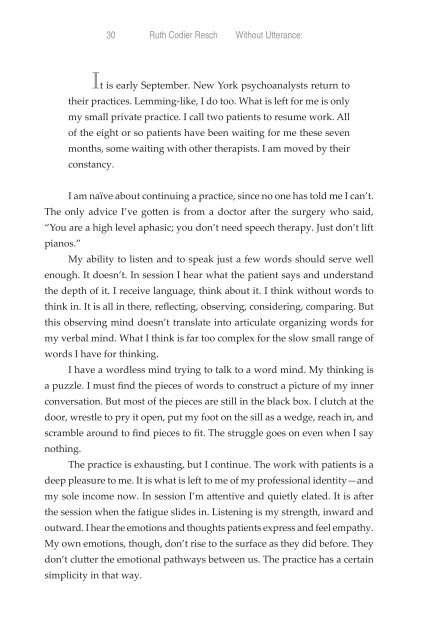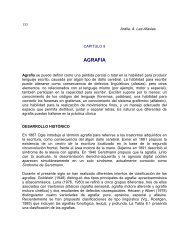the PDF of her book - National Aphasia Association
the PDF of her book - National Aphasia Association
the PDF of her book - National Aphasia Association
You also want an ePaper? Increase the reach of your titles
YUMPU automatically turns print PDFs into web optimized ePapers that Google loves.
30 Ruth Codier Resch Without Utterance:<br />
It is early September. New York psychoanalysts return to<br />
<strong>the</strong>ir practices. Lemming-like, I do too. What is left for me is only<br />
my small private practice. I call two patients to resume work. All<br />
<strong>of</strong> <strong>the</strong> eight or so patients have been waiting for me <strong>the</strong>se seven<br />
months, some waiting with o<strong>the</strong>r <strong>the</strong>rapists. I am moved by <strong>the</strong>ir<br />
constancy.<br />
I am naïve about continuing a practice, since no one has told me I can’t.<br />
The only advice I’ve gotten is from a doctor after <strong>the</strong> surgery who said,<br />
“You are a high level aphasic; you don’t need speech <strong>the</strong>rapy. Just don’t lift<br />
pianos.”<br />
My ability to listen and to speak just a few words should serve well<br />
enough. It doesn’t. In session I hear what <strong>the</strong> patient says and understand<br />
<strong>the</strong> depth <strong>of</strong> it. I receive language, think about it. I think without words to<br />
think in. It is all in <strong>the</strong>re, reflecting, observing, considering, comparing. But<br />
this observing mind doesn’t translate into articulate organizing words for<br />
my verbal mind. What I think is far too complex for <strong>the</strong> slow small range <strong>of</strong><br />
words I have for thinking.<br />
I have a wordless mind trying to talk to a word mind. My thinking is<br />
a puzzle. I must find <strong>the</strong> pieces <strong>of</strong> words to construct a picture <strong>of</strong> my inner<br />
conversation. But most <strong>of</strong> <strong>the</strong> pieces are still in <strong>the</strong> black box. I clutch at <strong>the</strong><br />
door, wrestle to pry it open, put my foot on <strong>the</strong> sill as a wedge, reach in, and<br />
scramble around to find pieces to fit. The struggle goes on even when I say<br />
nothing.<br />
The practice is exhausting, but I continue. The work with patients is a<br />
deep pleasure to me. It is what is left to me <strong>of</strong> my pr<strong>of</strong>essional identity—and<br />
my sole income now. In session I’m attentive and quietly elated. It is after<br />
<strong>the</strong> session when <strong>the</strong> fatigue slides in. Listening is my strength, inward and<br />
outward. I hear <strong>the</strong> emotions and thoughts patients express and feel empathy.<br />
My own emotions, though, don’t rise to <strong>the</strong> surface as <strong>the</strong>y did before. They<br />
don’t clutter <strong>the</strong> emotional pathways between us. The practice has a certain<br />
simplicity in that way.



